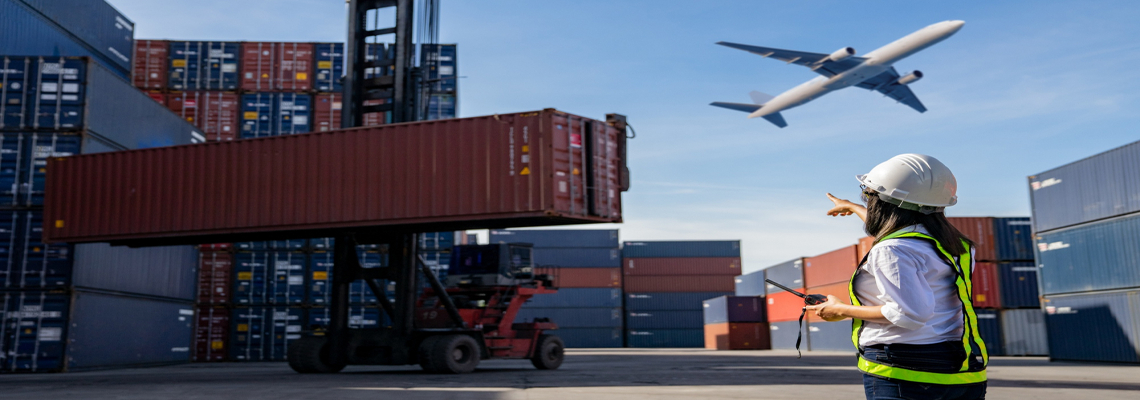 11 Jul 2023
11 Jul 2023
The Role of Freight Forwarding Companies in Global Supply Chains
In today’s globalised world, when things are produced and consumed across borders, the effective operation of global supply chains is critical. The force that makes this process simpler and provides a smooth supply of goods across borders is freight forwarding companies. Among the difficulties of international trade, they play an important role in ensuring the effective and seamless transportation of commodities.
These professional logistics services serve as intermediary companies, easing the movement of goods from suppliers to end users. In this blog, we will look at the crucial role that they play in global supply chains, with a focus on freight forwarders in Singapore. We will look at their roles, advantages, and how they help to ensure the seamless movement of products throughout the world.
Understanding Freight Forwarding Companies
A freight forwarding company is a specialized logistics service provider that manages and coordinates the transportation of goods on behalf of importers and exporters. They ensure the efficient and secure movement of goods from one point to another timely, and cost-effectively.
These companies have an extensive understanding of international trade laws as well as the complexity of various types of transportation. They are knowledgeable in numerous areas of the shipping process, such as paperwork, customs clearance, transportation management, warehousing, and risk management. In summary, they are capable of providing comprehensive solutions that are suited to the individual demands of their clients.
How do these companies operate?
-
Logistics and Transportation Management:
A wide network of carriers, including shipping lines, airlines, trucking companies, and rail operators, is maintained by them. Based on variables like price, transit time, and cargo volume, it aids them in selecting the most practical and economical transportation routes for clients that need to ship products.
They organise every step of the transportation process, from cargo consolidation through delivery and tracking. They optimise supply chains and guarantee prompt delivery of products thanks to their proficiency in transport management.
-
Managing Documentation and Customs Clearance:
They are well-versed in the documentation requirements and paperwork involved in international trade. They are proficient in streamlining the customs clearance procedure, enabling the easy movement of goods across borders. In order to ensure compliance with the legal and regulatory requirements of both the exporting and importing nations, they have a deeper understanding of crucial elements such as business invoicing and packing lists.
-
Real-time Tracking of the supply chain:
They use modern software and tools to track real-time visibility of the movement of products. These tracking tools also allow clients to monitor their shipments throughout the supply chain.
-
Warehousing and Inventory Management:
They have temporary warehousing and inventory management services for goods during transit. They provide secure storage facilities and handle inventory control, ensuring efficient stock management and proper handling. The warehouses are positioned in such a way that helps minimize transit times and improve overall supply chain efficiency.
-
Risk Management and Insurance:
In order to meet their client’s demands, they offer extensive insurance coverage after assessing potential risks associated with international trade, such as damage, theft, and delays. Their promise to provide financial protection in case of unforeseen events allows clients to be peaceful during the whole shipping process.
Advantages of Engaging a Freight Forwarding Company:
-
Cost Efficiency:
By utilising their experience, contacts in the business, and negotiation abilities, they are able to get reasonable prices for transportation and other logistical services. They examine the shipping route that is the most cost-effective and expedite the entire transportation procedure, which saves a lot of money. Businesses gain from cost optimisation since it lowers expenditures and boosts profitability.
-
Time efficient:
It might take a lot of time and effort to manage logistics for worldwide delivery. Businesses may concentrate on their core skills and save time by outsourcing these responsibilities to them.
-
Experience and skill:
They are well-versed in the laws governing international commerce, customs processes, necessary paperwork, and industry best practices. Their knowledge assures compliance, cuts down on delays, and prevents expensive mistakes.
-
Global Network:
They have a global presence and partnerships with agents and affiliates across the world. they can handle logistical and cultural problems with ease and guarantee the effective shipping of goods to any location worldwide. As a result, they are able to deliver seamless services across several nations and geographical regions.
-
Risk Management:
In order to reduce the possible effects of any damage sustained during transportation, they offer advice on insurance options and risk reduction approaches.
Conclusion:
Their role is very critical in the process of making the transportation of goods efficient across the world. They are like the backbone of the supply chain. The experience and expertise these companies have in every aspect of effective supply chain management ensure the streamlined movement of products from the producer to the end user.
They will remain key in boosting the growth and success of businesses in the worldwide marketplace as long as international commerce is in popularity.
